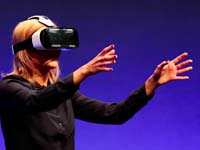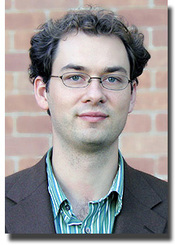University Course - Virtual Reality for Interdisciplinary Applications
 Virtual Reality for Interdisciplinary Applications (UNIV 3279) is a project-based introduction to Virtual Reality (VR), co-taught by faculty from Computer Science and History. VR is now a mainstream phenomenon. The New York Times provides VR journalism (and ships its subscribers cardboard viewers). Facebook owns the highest profile hardware manufacturer. Google, Microsoft and countless others are experimenting with hardware and content. In this course students from across the university will join students from Computer Science for an overview of the field of virtual reality, and substantive training in the appropriate tools. Furthermore, faculty mentors drawn from diverse disciplines will guide student teams to create real-world, consequential immersive VR simulations relevant to, and innovative in, their respective fields.
Virtual Reality for Interdisciplinary Applications (UNIV 3279) is a project-based introduction to Virtual Reality (VR), co-taught by faculty from Computer Science and History. VR is now a mainstream phenomenon. The New York Times provides VR journalism (and ships its subscribers cardboard viewers). Facebook owns the highest profile hardware manufacturer. Google, Microsoft and countless others are experimenting with hardware and content. In this course students from across the university will join students from Computer Science for an overview of the field of virtual reality, and substantive training in the appropriate tools. Furthermore, faculty mentors drawn from diverse disciplines will guide student teams to create real-world, consequential immersive VR simulations relevant to, and innovative in, their respective fields.
Instructors
 Robert Bodenheimer, Associate
Professor of Computer Science. Bodenheimer is generally interested in most areas of computer graphics and computer animation, though he is particularly focused on human figure animation research.
Robert Bodenheimer, Associate
Professor of Computer Science. Bodenheimer is generally interested in most areas of computer graphics and computer animation, though he is particularly focused on human figure animation research.
 Ole Molvig, Assistant Professor of History. Molvig's research interests include the history of astronomy, precision instrumentation, physics in WWI, popular science, and modern European intellectual and cultural history.
Ole Molvig, Assistant Professor of History. Molvig's research interests include the history of astronomy, precision instrumentation, physics in WWI, popular science, and modern European intellectual and cultural history.
Course Overview
Key features:
- Learn the technology and state-of-the-art in Virtual Reality, a technology that can transport you elsewhere, and allow you to share experiences in a unique and novel way.
- Engage in an interdisciplinary, cross-college experience. Students from across disciplines will form project groups to tackle problems brought to them by faculty from across the University.
- Students will be introduced to a variety of skill and tools and will imagine, plan, and execute ambitious projects aimed at real-world problems. By the end of the course, students will have fluency to plan and execute their own VR projects.
Degree requirements fulfilled:
- College of Arts and Science: Elective credit towards the degree.
- Peabody College: Elective credit towards the degree.
- Blair School of Music: Elective credit towards the degree.
- School of Engineering: Open Elective credit.
